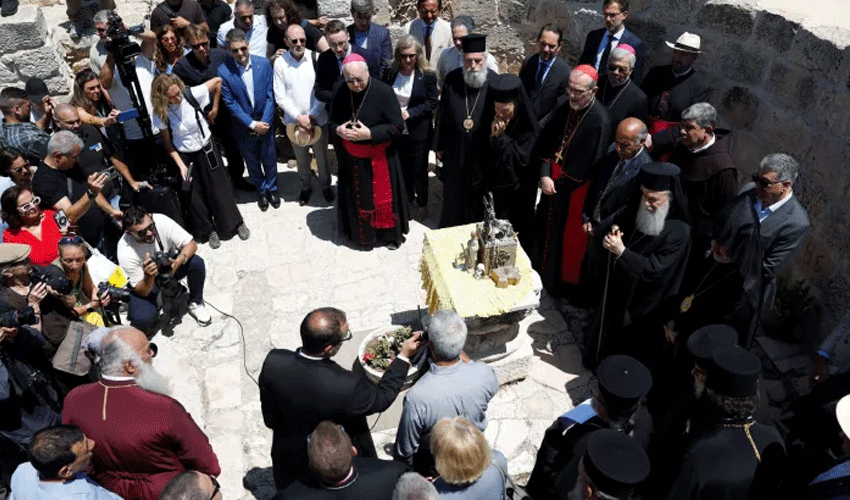Church leaders deem recent incidents as part of a broader pattern of harassment

Senior church leaders and foreign diplomats from over 20 countries visited the Christian-majority town of Taybeh in the occupied West Bank on Monday to express solidarity with local residents and to condemn the rising violence perpetrated by Israeli settlers in the area.
The delegation included representatives from the United Kingdom, China, Russia, Japan, Jordan, and the European Union.
Their visit followed a series of settler attacks on the town, which have intensified in recent weeks amidst the ongoing conflict in Gaza and a broader escalation of tensions across the occupied Palestinian territories.
Addressing the media during the visit, Greek Orthodox Patriarch Theophilos III and Latin Patriarch Pierbattista Pizzaballa strongly criticised Israeli authorities for what they described as a failure to protect the town’s Christian residents.
The leaders specifically referred to an incident last week when settlers allegedly set fire to land near Taybeh’s church and brought cattle to graze on privately owned Palestinian land.
“This is not only a violation of property, but a targeted attack on a community that has long been a symbol of coexistence and peace,” said Patriarch Theophilos III.
In a joint statement, the Patriarchs and Heads of Churches in Jerusalem called for a transparent investigation into the attacks, urging Israeli authorities to hold the perpetrators accountable. “These settlers are not acting alone. Their presence around Taybeh is both facilitated and enabled by state policies,” the statement said.
The town of Taybeh, located northeast of Ramallah, is home to one of the few remaining Christian communities in the West Bank.
Church leaders have described the recent incidents as part of a broader pattern of harassment and land-grabbing aimed at displacing Christians from the area.
Al Jazeera’s correspondent Nida Ibrahim, reporting from Doha, noted that many in the Christian community see these attacks not only as acts of religious intolerance but as an extension of the broader occupation.
“They consider themselves under attack not just because they are Christians, but because they are Palestinians,” she said.
Rights groups and local media have documented repeated attacks by settlers—often armed and accompanied by Israeli soldiers—on Palestinian homes, vehicles, and farmland. The frequency and scale of these assaults have increased since Israel launched its military campaign in Gaza in October last year. In addition to settler violence, Israeli military raids across West Bank towns have killed hundreds of Palestinians and displaced tens of thousands.
On Monday, new settler assaults were reported in various areas, including Bethlehem. In the village of al-Maniya, settlers reportedly uprooted more than 1,500 olive saplings and pitched tents in a show of force. The head of the local council, Zayed Kawazba, told the official Palestinian news agency Wafa that the saplings belonged to the al-Motawer and Jabarin families.
Meanwhile, in Al-Mazraa ash-Sharqiya, hundreds of mourners attended the funeral of two young men killed during a settler attack on Friday.
Patriarch Pizzaballa, the most senior Catholic official in the region, described the situation in the West Bank as descending into lawlessness. “The only law that exists here is the law of force,” he said. “We must restore the rule of law so that everyone, regardless of their background, can appeal for justice.”
The occupied West Bank, home to over three million Palestinians, remains under tight Israeli military control. The Palestinian Authority governs limited pockets of the territory, which are heavily fragmented and separated by checkpoints and Israeli settlements. More than 500,000 Israeli settlers now live in over 100 settlements considered illegal under international law.
Church leaders and diplomats urged the international community to act urgently to protect vulnerable communities in the West Bank and to uphold international legal standards in the occupied territories.
